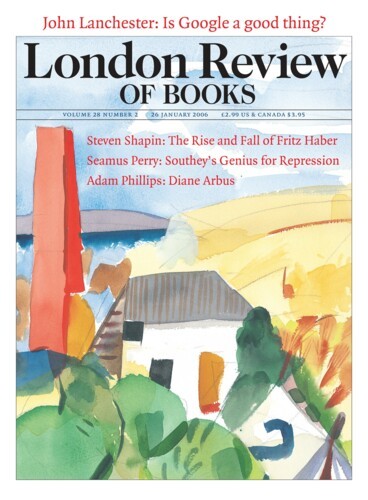The late Gardner Botsford was for almost four decades – from 1942 till 1982, with a couple of years off fighting the Nazis – an editor at the New Yorker. Among the many good things in his elegant and enjoyable memoir, A Life of Privilege, Mostly (Granta, £12.99), are ‘a few observations on how fiction should be handled’ by Wolcott Gibbs, who, before he became the New Yorker’s theatre critic, ‘had been (I was told) the best editor the magazine had ever seen’. ‘Writers always use too damn many adverbs,’ the first of Gibbs’s observations begins. ‘On one page recently, I found five modifying the verb “said” – “he said morosely . . . violently . . . eloquently” and so on. Editorial theory should probably be that a writer who can’t make his context indicate the way his character is talking ought to be in another line of work.’ Some of the others are terser: ‘On the whole, we are hostile to puns’; ‘Try to reserve the author’s style, if he is an author and has a style.’
Botsford later adds a few ‘conclusions about editing’ of his own:
Rule of thumb no. 2: The less competent the writer, the louder his protests over the editing. The best editing, he feels, is no editing. He does not stop to reflect that such a programme would be welcomed by the editor, too, allowing him to lead a richer, fuller life and see more of his children . . . Good writers lean on editors; they would not think of publishing something that no editor had read. Bad writers talk about the inviolable rhythm of their prose.
Hard for an editor to read that without smiling. Writers who think it only goes to show what a bunch of interfering megalomaniac know-nothings editors are may be appeased by rule of thumb no. 6: ‘Good editing can turn a gumbo of a piece into a tolerable example of good reporting . . . Good writing exists beyond the ministrations of any editor . . . A good editor is a mechanic, or craftsman, while a good writer is an artist.’ And Botsford isn’t slow to praise writers he admires: A.J. Liebling, ‘both a wonderful reporter and a stylish writer’, ‘resisted all rules of thumb’.
The reasons editors cut extraneous adverbs are perhaps less mysterious than their reasons for running or not running certain stories. For instance – though this applies more to the editors of newspapers – the recent revelations about Charles Kennedy’s alcoholism. No one was especially surprised when the Liberal Democrat leader confessed on 5 January: journalists had known – and had been dropping hints – about his drinking problem for a very long time. They had refrained from actually running the story in part because, without a reliable source willing to make a statement on the record, there was, strictly speaking, no story. But being a good reporter is about making stories by getting people to tell you things. (According to Botsford, Liebling ‘could get a story out of anybody’. He would ‘park himself in a chair across from his prey, his face creased in smiles and good will – and never say a word. Total silence. After three of four minutes of this, the victim would be seized by the universal abhorrence of a conversational vacuum and start singing like a bird.’) And rumour had it that ITN was threatening to turn Kennedy’s ‘secret struggle’ into a news item, which is why he finally came clean about it himself.
So politicians’ secrets are kept by a tacit agreement between their friends and colleagues and the press. Kennedy stopped being ‘in denial’ about his alcoholism and ‘sought professional help’ in spring 2004. With only a year to go until the general election, it obviously wasn’t in the interests of any Lib Dems, including Kennedy’s enemies and rivals, to cause havoc by speaking up. And then Michael Howard announced his intention to stand down as Conservative leader the day after the election, when there were still a few seats not declared. So any Lib Dems eager to stab Kennedy in the back would have to wait until after the Tories sorted themselves out, if their own change of leadership was to make major headlines and be more than a support act for the clash of the Davids. With David Cameron boyishly – and buoyantly – installed in the middle of the opposition front bench, the time was at last ripe for overthrowing Kennedy. If the conspirators had waited too much longer, there was always the danger that they might have found coverage of their coup overshadowed by the downfall of the prime minister (in Gordon Brown’s dreams).
When politicians fall, it’s in everyone’s interest that they fall hard; Kennedy’s suggestion that he stand for re-election was never going to go down well. At least he’s now free to write his memoirs, though they won’t be a patch on Gardner Botsford’s.
Send Letters To:
The Editor
London Review of Books,
28 Little Russell Street
London, WC1A 2HN
letters@lrb.co.uk
Please include name, address, and a telephone number.

